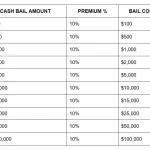Our bail bonds FAQ covers questions that a co-signor needs to know, especially if they are on the hook for thousands of dollars and think the defendant may skip court (FTA or Fail To Appear). If you are thinking of becoming an indemnitor/co-signor, please read through this bail bonds FAQ to be sure you understand the risks involved.
Or, if you’re trying to get approved for a bail loan or need bail financing, read through our bail bonds FAQ to discover the answers to questions others are asking about bail.
What is a Bail Bond?
Simply put, a bail bond is a contract between the bail bond company (or bail agent), the courts, and the indemnitor and/or co-signor. The indemnitor guarantees the bail bond company that the defendant will appear at all future court dates and court appointed meetings and will abide by the rules of the court and of course the rules of the bail bonds company. This service will have a fee associated with it via a percentage of the bond.
What will I need to bond someone out of jail?
Naturally, you’ll need the information about the defendant, the bond fee (roughly 10% or more – check with your bondsman), a cosigner (you), and possibly some form of collateral if required by the bond company.
What information do I need when I call a bondsman?
When you call a bondsman, you’ll need to give them the defendant’s full name, bail amount(s) and jail location. If you know the charges, let the bondsman know this as well.
How much does a bail bond cost?
All states have different rates for bail bonds, but typically it is 10% of the entire bond amount. Some states like Florida and Connecticut have tiered bond rates you should be aware of. Please contact your bail bondsman to receive a quote. You’ll probably get the same rate amount from all bondsmen you call. Also, bondsmen know you are calling around if the first question you ask is how much the bond will cost. If you can’t afford bail, ask if any payment arrangements can be provided.
How much do I pay a bondsman if my bail is $150,000?

Calculating bail is simple. You take the amount of your cash bond and multiply by 10%. To help calculate your bail, we’ve set up this simple bail schedule that shows the premium amount you’ll pay a bondsman near you:
Where are bail bonds written?
Bail bonds agents can write bonds anywhere. You can meet them at the jail, but may be the last place you want to write the bond. One of the best places to take care of bond business is a diner or restaurant. This puts everyone at ease and allows you to get to know the bondsman. Bonds can be written anywhere in the state or county where the bondsman is licensed.
Is the bail bonds fee refundable?
No. Once a bail bond has been posted for the defendant, that money is taken as payment for writing the bond by the bail bond company.
What is a cosigner?
A cosigner is the person who takes financial responsibility for the bail bond if the defendant fails to appear in court. Financial responsibility can include the entire bond amount, skip tracing fees, bondsman fees for capture and any office or associated fees by the bond company. Example, if they have to hire a bounty hunter to find the defendant to bring them back to justice.
What is collateral?
Collateral can be money, jewelry, cars, property, or anything of value that the bondsman holds while the defendant is released on bail. Once the case has been completed the collateral is returned.
How do I know when the defendant has to go to court?
As the co-signor, it’s imperative that you ensure the defendant goes to all court appointed meetings and of course, the trial. Not doing so can cost you the entire bond. You can always check the state or county court docket as most are online. You can also call the bondsman as they’ll have the information posted to the defendants file.
What should I do if I know the defendant is going to run off?
If you’re the cosignor (indemnitor), you’re liable for the full amount of bail plus any fees associated with catching the defendant and putting them back in jail. If you have heard the defendant has been talking about not going to court and running off, you need to alert the bondsman immediately so they can begin the process forfeiting the bond. Be sure you’ve written down any and all information to how you heard, who you heard this information from and when.
How do bail bonds work?
How bail works is simply a way to ensure the defendant goes to all court appointment and abides by the rules of the court when out on bond. Either a Signature Bond (ROR), Property Bond or an amount of money (cash bond) will be assigned to get them out of jail. This is called the bail bond and this is how bail bonds work. Once you pay 100% of the bond to the court, or 10% of the bond (the premium) to a bondsman, the defendant will be released from jail with conditions. Watch this quick video about how bail works.
Your Most important Bail Bonds FAQ Answered
We hope this bail bonds FAQ (frequently asked questions about bail) section answers all your questions and quells any fears about using bail bonds services. If you have any further bail related questions, please feel free to ask them at our “Ask A Bondsman” section of the site.
You can get more questions about bail answered by sending us a message in a “Bail Bonds FAQ” message via our contact page.

